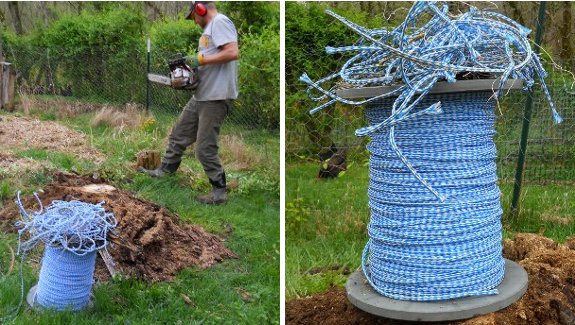
Creepy nylon

I posted
yesterday about the
possibility of using nylon rope instead of 14 gauge electric fence wire
on our next gate.
Turns out that was a creepy
suggestion that should be avoided for this particular application.
The main reason I was
considering nylon was because we have a massive spool of it. (Thanks
Mom)
A timely comment from Roland
was what set me straight. The nylon rope would more than likely stretch
over time due to the constant stress of the turnbuckle. The material
science term for this influence is known as creep. A word that creeped
its way into the music industry not once but three times in recent
history thanks to bands like Radiohead, TLC, and Stone Temple Pilots.
Want more in-depth information? Browse through our books.
Or explore more posts by date or by subject.
About us: Anna Hess and Mark Hamilton spent over a decade living self-sufficiently in the mountains of Virginia before moving north to start over from scratch in the foothills of Ohio. They've experimented with permaculture, no-till gardening, trailersteading, home-based microbusinesses and much more, writing about their adventures in both blogs and books.
Want to be notified when new comments are posted on this page? Click on the RSS button after you add a comment to subscribe to the comment feed, or simply check the box beside "email replies to me" while writing your comment.

Are you sure that is nylon. It looks like polypropylene. Nylon can stretch as much as 30 percent and return to normal. It is a giant rubber band and that's why it is used as anchor line on boats. It's strength is in it's stretch. Dacron(polyester I think) on the other hand stretches very little. Take a piece of that and see if it floats. Nylon does not float.
From a photo I cannot identify a type of plastic, but take a look at the spool. If it is the original spool, there might be an identification label on it.
Ordinary rope made from plastic is usually braided. This will elongate quite a lot when new because the braid stretches during the first uses. (This is a completely seperate matter from the creep of the fibers themselves, btw.)
The rope with the least elongation made e.g. for use on sailing vessels usually has a kernmantle contruction, where a core of unidirectional fibers is held together by a braid. Since the core is already straight, you won't get the stretching that you get from a full braided rope.
But the thermoset plastics itself will still creep a lot (compared to metals and thermosets). This is a very slow process though. It is usually measured on a logarithmic scale as elongation over 10ⁿ hours under a constant force, where n is an integer roughly in the range 1-7.
Both polyamide ("PA", nylon) and polyethylene terephthalate ("PET" dacron) have a density higher than water, so they should both sink (unless there is air trapped in the braid!)
The most used polymers like polyethylene ("PE") and polypropylene ("PP") have a density lower than that of water, though.
There are multiple lists of polymer densities on the interwebs, like this one.